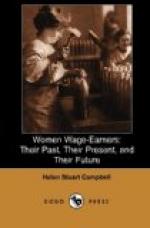“Wages have steadily decreased. Among the women who earned the whole or part of the income, finishing pantaloons was the most common occupation. For this work, in 1881, they received ten to fifteen cents a pair; for the same work in 1891, three to five, at the most ten cents a pair. The women doing this work claim that wages are reduced because of the influx of Italian women, but few Italian women do the poor quality of trousers. While we are glad to note some excellent sanitary changes in the tenement-house construction, the people we believe to be just as poor, just as overcrowded and wretched to-day, as in 1881 and 1853, the only difference being that there are a greater number of people who are poor now.”
These statements apply in great part to unskilled labor; but there is always in these houses a large proportion of skilled labor disabled by sickness or other causes and out of work for the time being. The wage at best for skilled labor is given by the Labor Commissioner as $5.29. Let any one study the possibilities of this sum per week, and the wonder will arise, not why living is not easier, but how it goes on at all.
Specific evils speak for themselves, and are gradually being eliminated. They are before the eyes, and the least experienced student may gauge their bearing and judge their effects. But wider-reaching than any or all the worst abuses of the worst trades is the wrong done to the child and to family life as a whole, by the continuous labor of married women in factories, or at any occupation which demands, for ten hours or more a day, unremitting toil. At all points where scientific observation has been made the expert lifts up a warning voice. It is the future of the race that is in question. Child labor, while not entering directly into our present examination, is, as has already been said, inextricably bound up with the question of woman’s work and wages. The two must be studied together; and for our own country there are already admirable monographs on this subject,[44] two authoritative ones coming from the American Economic Association, and one hardly less so from a close and keen observer whose scientific training gives her equal right to form conclusions.[45]
A dispassionate observer, Mr. W. Stanley Jevons, whose conclusions are founded on long investigation and deduction, years ago wrote words which he has at various times emphasized and repeated, and which sum up the evils to which the infancy of the children of overworked mothers is subject, as well as the consequences to the State in which they are born, and which faces the results of the system which produces them. He writes as follows:—




